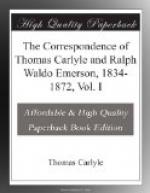Our community begin to stand in some terror of Transcendentalism, and the Dial, poor little thing, whose first number contains scarce anything considerable or even visible, is just now honored by attacks from almost every newspaper and magazine; which at least betrays the irritability and the instincts of the good public. But they would hardly be able to fasten on so huge a man as you are any party badge. We must all hear you for ourselves. But beside my own hunger to see and know you, and to hear you speak at ease and at large under my own roof, I have a growing desire to present you to three or four friends, and them to you. Almost all my life has been passed alone. Within three or four years I have been drawing nearer to a few men and women whose love gives me in these days more happiness than I can write of. How gladly I would bring your Jovial light upon this friendly constellation, and make you too know my distant riches! We have our own problems to solve also, and a good deal of movement and tendency emerging into sight every day in church and state, in social modes and in letters. I sometimes fancy our cipher is larger and easier to read than that of your English society.
You will naturally ask me if I try my hand at the history of all this,—I who have leisure, and write. No, not in the near and practical way in which they seem to invite. I incline to write philosophy, poetry, possibility,—anything but history. And yet this phantom of the next age limns himself sometimes so large and plain that every feature is apprehensible, and challenges a painter. I can brag little of my diligence or achievement this summer. I dot evermore in my endless journal, a line on every knowable in nature; but the arrangement loiters long, and I get a brick kiln instead of a house.—Consider, however, that all summer I see a good deal of company,—so near as my fields are to the city. But next winter I think to omit lectures, and write more faithfully. Hope for me that I shall get a book ready to send you by New-Year’s-day.
Sumner came to see me the other day. I was glad to learn all the little that he knew of you and yours. I do not wonder you set so lightly by my talkative countryman. He has brought nothing home but names, dates, and prefaces. At Cambridge last week I saw Brown for the first time. I had little opportunity to learn what he knew. Mr. Hume has never yet shown his face here. He sent me his Poems from New York, and then went South, and I know no more of him.
My Mother and Wife send you kind regards and best wishes,—to you and all your house. Tell your wife that I hate to hear that she cannot sail the seas. Perhaps now she is stronger she will be a better sailor. For the sake of America will she not try the trip to Leith again? It is only twelve days from Liverpool to Boston. Love, truth, and power abide with you always!
—R.W.E.




